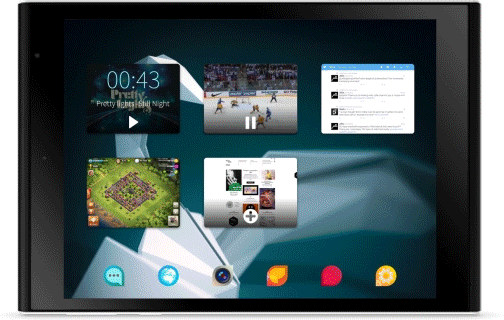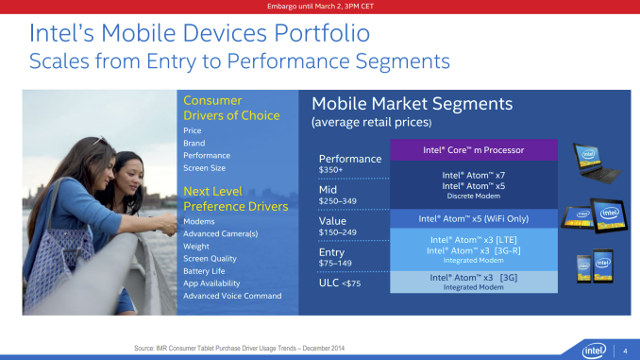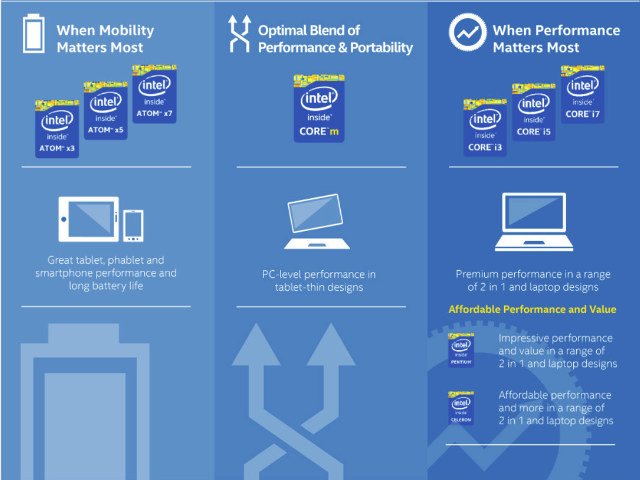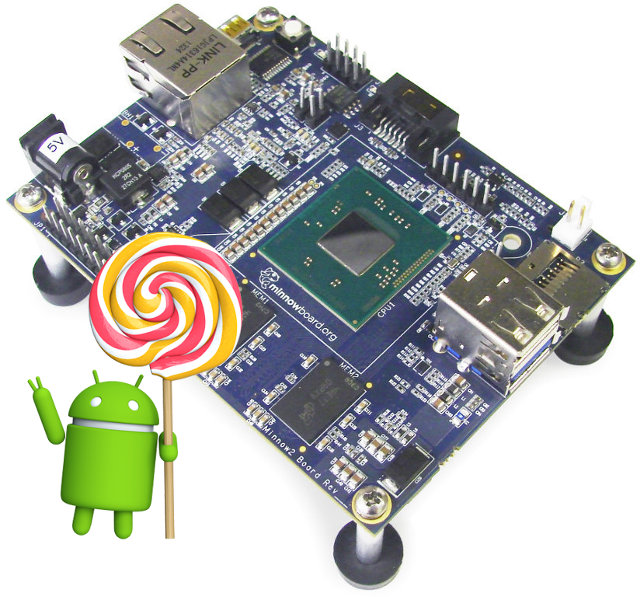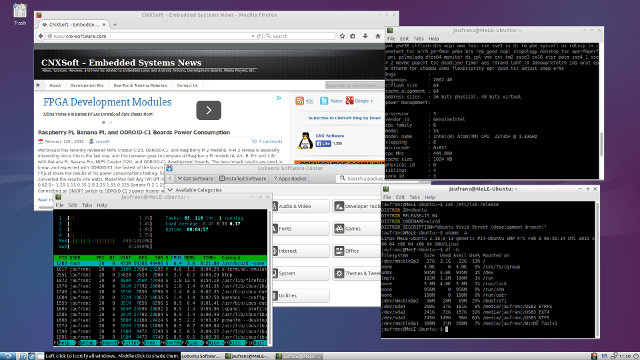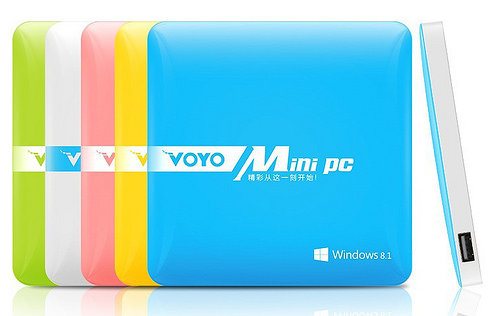Console Inc., previously Mobile Media Ventures, Inc., is the company developing Console OS operating system based on Android 4.4 / 5.0 for Intel platforms that includes customizations for a better desktop experience, and you can already try the preview version of Console OS Standard for free on some Intel hardware, with another paid version to become available at the time of the stable release. The company has now announced iConsole Micro a Console OS HDMI TV Stick based on a quad core Intel Atom processor that looks very much like MeegoPad T01, but it’s said to be based on Intel Compute Stick technology. iConsole Micro specifications have not been fully released, but here’s what we know so far: SoC – Unnamed Intel Atom 64-bit quad core processor System Memory – 2 GB RAM Storage – 32 GB eMMC + micro SD slot up to 128GB (160GB in total) Video & […]
Jolla Opens Sailfish OS 2.0 for Licensing, Unveils Sailfish Secure, Plans Atom x3 Support
As the Jolla Tablet running Sailfish OS 2.0 is about to ship to Kickstarter backers (Q2 2015), the company has issues a press release announcing Sailfish OS 2.0 is now ready for licensing to OEMs and other partners, and OS porting is being done to the newly announced Intel Atom x3 processors. Sailfish OS 2.0 has been designed for both smartphones and tablets with the following key changes and improvements: Stronger technical OS core and improved Android application compatibility Support for Intel architecture, including the Intel Atom x3 processor Best multitasking on the market for both smartphones and tablets Improved user experience with an enhanced, even richer user interface Strong privacy and personalization features Many new UI/UX features, like enhanced notifications and events views, and even simpler swipe access to main functions Sailfish 2.0 is designed to provide premium visibility in the UI for leading digital content providers and to […]
Intel Provides Details for Atom x3, x5 and x7 Processors
Intel had already announced their plan to change Intel Atom branding to use x3/x5/x7 nomenclature in order to make it easier for consumers to navigate their product offerings, but the company has now provided much more details during their press conference at Mobile World Congress 2015. Intel Atom x3 (previously known as SoFIA) will be entry and ultra-low cost processor up with 3G or LTE connectivity found in products up to around $150, while Atom x5 and x7 (previously known as Cherry Trail) will be found in tablets between about $200 to $400, with the top performing devices going with Intel Core M processors. Intel Atom x3 are very interesting because they mix Intel 64-bit cores with ARM GPUs (to keep the cost down), and parts with RK suffix are made by Rockchip. Three x3 processors are currently available: Intel Atom x3-C3130 – Dual-core processor up to 1.0 GHz with […]
Console OS Developer Preview Image Released for Some Intel Haswell and Bay Trail Systems
Console OS is an operating system based on Android that’s designed to run on x86 machines side-by-side with Windows and with desktop-friendly user interface. The project has been funded via a Kickstarter campaign, so backers get the updates earlier, but the developers have now publicly released Console OS DR1 (Developer Release 1) based on Android 4.4.2 so that more people can download it and try it for free after registration. I wanted to try it on Mele PCG03, but it failed, even after copying bootia32.efi to /EFI/BOOT directory (I get stuck into Grub command line), and I found out that “Systems must have 64-bit UEFI firmware. Some systems have 32-bit UEFI firmware, and we are working on adding support for those provided you have one of the processors above”. So it won’t work on cheap Windows 8.1 dongles and mini PC like MeegoPad T01 or Pipo X7, but MINIX NEO […]
Intel Introduces Atom x3, x5 and x7 Categories for Its Upcoming Low Power Processors
Intel has been using Core i3, i5, and i7 models for its desktop processor for a few years in order to help consumers chose between entry-level, mid-range, and high-performance processor, although you may also want to look at the launch date as some Core i7 launched in 2010 may be quite slower than Core i3 launched in 2013 or 2014 for example. Intel has now decided to use a similar naming scheme for its next generation Atom processor used in tablets, phablets, and smartphones with Atom x3, Atom x5, and Atom x7 product ranges instead of the often confusing names like Z3735F, Z3580, etc.. The company will still offer slightly more powerful Pentium and Celeron processor for 2-in-1 laptop designs and mini PCs, as well as new Core-M processors for low power and PC-like performance think laptops or tablets. Via Liliputing and UMPCPortal Jean-Luc Aufranc (CNXSoft)Jean-Luc started CNX Software in […]
Android 5.0 Binary and Source Code Release for Minnowboard MAX
Yet another development board gets a Lollipop update with Minnowboard MAX powered by Intel Atom E3815 or E3825 Bay Trail-I processor. Intel’s android-5.0.1_r1-ia0 release uses a 64 bit kernel and a 32 bit userspace, and supports all on-board peripherals such as Ethernet, HDMI (digital Audio + Video), USB host, SATA, I2C+SPI, GPIO, PWM and UART. New features and improvements features for this release include: Digital audio support using HDMI and USB. Linux console on serial port for debugging purposes. Android can be installed on SDCard, USB Stick or SSD. Android Runtime (ART). Material Design UI. Bluetooth 4.0 support using an external USB dongle. SELinux runs in enforcing mode. User data is encrypted by default. Bug fix – GPIO support The image is intended for developers interested in working with Android 5.0 on MinnowBoard MAX, but it does not have all the components to meet Android Compatibility requirements. If you own […]
How To Install Ubuntu 15.04 on MeLE PCG03 Intel Mini PC
I’ve already spent some time to test MeLE PCG03 Bay Trail-T mini PC in Windows 8.1, including a detailed video and audio review in Kodi 14.1. Since I don’t have anything else to do with Windows on the machine, I’ve decided to install Ubuntu instead, completely wiping out Windows 8.1. Since you pay around $30 for the Windows license, MeLE PCG03 is not the ideal platform computer for this little exercise due to the extra cost, but it should also work with other Intel Atom Z3735F based computer that may not come with a license. At first I planed to go with Ubuntu 14.10 Mate ISO image, and it boots fine, but was curious to try from “scratch” with another ISO, so I went with Ubuntu 15.04 Alpha 2 (64-bit) image. I just went to the first link Google Search provided me and did not pay attention enough, and ended-up […]
Intel Atom Z3735F Based Voyo Mini PC Features 64GB Storage, a 1,000 mAh Battery
Most mini PCs powered by Intel Atom Z3735F “Bay Trail-T” processor on the market only come with 16 to 32GB internal storage, and based on my experience with MeLE PCG03, even 32GB eMMC can fill up pretty quickly on a Windows 8.1 machine. Now there’s an option with 64GB storage thanks to Voyo Mini PC. Voyo mini PC specifications: SoC – Intel Atom Z3735F “Bay Trail” quad core processor @ 1.33 GHz (Bust freq: 1.83 GHz) with Intel HD graphics System Memory – 2 GB DDR3 Storage – 64 GB eMMC + SD card slot (up to 128 GB) Video Output – mini HDMI 1.4 (Does not support 4K video) Audio Output – mini HDMI, and 3.5mm audio jack Connectivity – 802.11 b/g/n Wi-Fi, and Bluetooth 4.0 USB – 3x USB 2.0 host, 1x micro USB for power Misc – Power Button, power LED Battery – 10,000 mAh battery 1,000 […]


